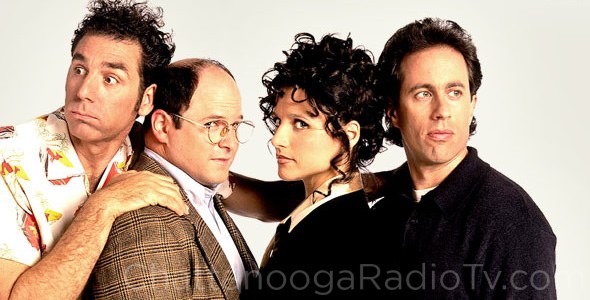I caught a “Seinfeld” rerun the other night. Between the laughs, I remembered how NBC was reluctant at first: the show was too Jewish, too New York, and of course, it was about nothing. After the first four episodes aired in the summer of 1989, NBC lost interest for a while. The show was offered to Fox, and in a decision I bet they’d love to have back, they turned it down. In 1991, NBC gave it another chance and the rest is TV history. I scoured the archives and found this interview I did with Jerry Seinfeld right before the show was re-launched on NBC.
It took a couple of years to really catch on, but from 1993-98, “Seinfeld” was consistently ranked among the top 3 shows on TV. It gave us George Costanza’s hopeless schemes, Elaine’s bad dancing, nagging parents and the great physical humor of Cosmo Kramer. There were the unforgettable recurring characters like Newman, Uncle Leo, the Soup Nazi and “George Steinbrenner.” Endless catchphrases live on to this day: “Yadda yadda yadda,” “No soup for you,” and “Not that there’s anything wrong with that,” to name a few.
Jerry Seinfeld is not an actor now, nor was he then, and you won’t find his name on any list of Emmy winners for acting. In many scenes, it looks like he is struggling to keep a straight face. He is a stand-up comedian, a great one, and was smart enough to surround himself with excellent comic actors: Jason Alexander, Julia Louis-Dreyfus and Michael Richards created iconic characters, and it could be argued that Alexander and Richards still struggle to escape their “Seinfeld” identities. They were that good. They became George and Kramer. Somehow, Louis-Dreyfus has gone on to other roles, although I still see a little “Elaine” in all of them, don’t you? From what’s been written over the years, Richards was a perfectionist, and would get frustrated when his cast mates would mess up a scene. Unlike his Kramer character, he was indeed organized. But like his Kramer character, he may have been a little, well, off-center. Here’s a brief, but great blooper reel that shows the cast in full, glorious dysfunction:
One thing I admire about Jerry: he knew when to call it quits. His show was on top, and he felt like there was nowhere to go but down. He’d made plenty of money, he knew the reruns would keep the cash pouring in, and he could afford to work when he wanted. He could simply take his stand-up act on the road. You haven’t seen him try to update the series with a new version (which nearly always fails), there’s been no reunion movie (usually a bad idea), and there were no second-rate spinoff series, like “George” or “Kramer.” Unlike some TV comic actors I could name, he didn’t go on to make the same bad movie over and over. He seems comfortable with who he is, and what he accomplished at a particular point in time. “Seinfeld” was once in a lifetime. He had seen others who couldn’t stop chasing the fame, trying to stay on top. In all but a few cases, they weren’t able to recapture the magic.
I’m glad someone at NBC decided to roll the dice and take a chance on some unproven actors and writers who wanted to do a show about nothing. Unlike today, the network had the patience to endure a few years of unspectacular ratings until it finally came together. “Seinfeld” reruns hold up well today because they weren’t particularly topical. They were about mundane everyday problems like waiting on a table, or finding your car in a massive parking garage. Just like “Lucy” having a baby, these shows will still be funny generations from now. “Seinfeld” could push the envelope at times, but it was never out-and-out gross like almost every current CBS sitcom except “Big Bang Theory.” Plus there’s a certain nostalgia watching Jerry and his friends navigate the world just before the Internet era exploded. It may have been our last big sitcom before everyone was attached to a cell phone, blogging, net-surfing, tweeting and texting.
In 1998, the “Seinfeld” cast filmed the show’s final episode, and a photographer captured this moment at the end of the day. I’m sure they knew it was time to go, but that didn’t make it any easier.





Thanks for sharing!! You are correct in that Seinfeld knew when to stop. I do not care for all the new remakes that are coming out these days.